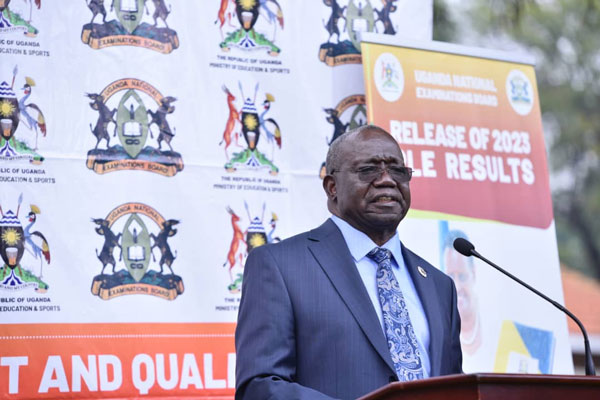
Kampala, Uganda | THE INDEPENDENT | Panic has gripped Uganda National Examinations Board (UNEB) as several examiners marking the first Senior Four national examinations under the new lower secondary curriculum abandoned marking centers over a pay dispute.
The walkout that occurred over the weekend involved examiners who had been confined at Namugongo Secondary and Vocational School Centre, along with other marking centers. The situation escalated after UNEB failed to address the examiners’ concerns regarding pay. Frustrated by what they considered unfair compensation and overwhelming workloads, the examiners chose to leave rather than continue under uncertain terms.
One of the examiners from Wakiso posted the issue in a teacher WhatsApp group: “Hello guys, the truth is, we are out and UNEB was not willing to offer as per the scoring requirements. We used to mark averagely 200 scripts per person daily but this time we marked the first day & the average was 50 scripts & of which in the invitation letter there was no rate bse (sic) they knew people won’t go if they had disclosed.”
The teacher explained that the examiners initially staged were open to talks, hoping to have their grievances addressed. However, no top UNEB officials showed up to respond to their concerns. Instead, the situation escalated when security personnel deployed at the centers reportedly ordered the teachers to either return to work or vacate the premises.
“We tried to negotiate with UNEB, but no officials showed up. Instead, UPDF soldiers told us to go back to the marking rooms or leave. We chose to leave,” an examiner recounted. According to the teachers making is expected to kick off today (Monday, November 16,2024)
He further claimed that by evening, over 250 out of 430 physics examiners had walked out in protest, though these figures remain unverified by URN.
Another agriculture examiner also expressed frustration over UNEB’s lack of transparency regarding pay. He explained that they were invited to mark scripts without being informed of the compensation rates beforehand. During a briefing, they were told they would be paid UGX 950 per script, a rate many found unacceptably low compared to their demand of at least UGX 1,500 per script.
The examiner said that after failing to reach an agreement with the UNEB officail on-site, approximately 70 agriculture examiners decided to leave and return home. The examiner also noted that other subjects appeared to be offered slightly higher rates per script, adding to their dissatisfaction.
He highlighted the demanding nature of marking under the new competence-based curriculum, which involves decoding multiple grids, reading through students’ work thoroughly, and applying complex scoring criteria. This, he said, significantly limits the number of scripts an examiner can handle daily.
“Based on our calculations, we expected to earn at least UGX 1 million, but at the current rate, we would only take home about UGX 700,000. For the amount of work involved, this pay is far from adequate,” the examiner concluded.
Another examiner from Mityana district, highlighted the labor-intensive nature of marking agriculture papers, which consist of four sections requiring detailed coding, grids, and calculations. This complexity, he observed, significantly increases the workload and warrants higher compensation.
He also noted that examiners had spent four days at the marking center on preparatory tasks before actual marking began. Despite this, UNEB had not disclosed the payment rates during this period, further aggravating the frustration among the examiners.
Jennifer Kalule, the UNEB spokesperson, confirmed the walkout involving agriculture examiners, stating that over 56 examiners officially left the marking centers. She expressed optimism that the remaining examiners would manage the workload and ensure the marking process continues.
Kalule added that UNEB is actively engaging with the teachers to address their concerns and resolve the issue. She emphasized that despite the challenges, the board remains confident in completing the marking exercise.
During the budgeting process, UNEB faced a funding shortfall following adjustments made in the 2024 Appropriation Bill.
The Parliamentary Education Committee had identified significant unfunded priorities in UNEB’s budget and proposed reallocating funds from other budget areas to address them. This proposal was part of a broader reallocation of 750 billion shillings aimed at addressing critical national priorities highlighted by MPs.
However, President Museveni returned the appropriation bill for reconsideration, rejecting the reallocation of funds originally designated for other purposes including UNEBs activities.
Initially, UNEB was allocated 6.5 billion shillings to support O’ Level transitional examinations and an additional 6.5 billion shillings for assessments under the new lower secondary curriculum. Parliament had also allocated an extra 8.5 billion shillings for examiner accommodation, payments, and meals during the marking process, reflecting the logistical and operational needs of national examinations.
The funding crisis has placed UNEB under pressure, particularly as it navigates the demands of implementing the new lower secondary curriculum and ensuring the successful execution of this year’s examinations.
****
URN
 The Independent Uganda: You get the Truth we Pay the Price
The Independent Uganda: You get the Truth we Pay the Price



